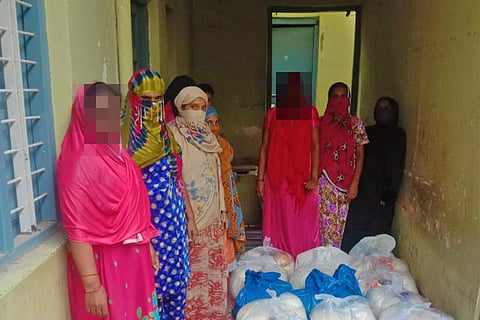

By the time the lockdown in Karnataka is slated to end on June 7, the state would have been under lockdown for almost a month. In this time, while some people have had the privilege of working from home and availing online deliveries and other concierge services to meet their needs, thousands have lost their sources of livelihood, financial and food security. To address this, two women in Bengaluru, along with their networks of volunteers, organisations and shopkeepers, have devised a model that they say is easily replicable on a small as well as large scale to help provide ration kits to those in need.
“We started last year, through a network that we had built. It began with helping out people in Shivaji Nagar with ration kits during the lockdown,” says Rheea Rodrigues Mukherjee, a city-based writer, who is associated with the Bangalore Pledge Project, as the initiative is called. She and Nisha Abdulla, a playwright and educator, used their network of people and social media to popularise the initiative and encourage others to pledge certain amounts of money to the project.
The pledge project was tested out last year, when the first lockdown was imposed. Volunteers in their know would identify communities in need of ration kits. Then, local shopkeepers were identified and collaborated with them, to put together the ration kits – each kit was roughly worth Rs 1000 and was meant to last a family of four around 10 to 14 days. Contributors would pay their pledged amount directly to the shopkeeper, which was tallied with the shopkeeper by a volunteer who had a record of the pledgers and the amount promised by them.
While they managed to raise Rs 11 lakh last year, this year, they raised around Rs 20 lakh in four weeks, and have already given kits to over 2,000 families. However, the beauty of this model, Rheea says, is that it can be applied at a much smaller scale, and so, anyone can do it. “This can work in just your area. For example, even if you have five construction workers working on the building near your house, their families can be helped with the help of the local shopkeeper and one volunteer. But people don’t think that way – they wonder, where do I put my money. Anyone, from the smaller scale to Resident Welfare Associations to bigger networks like ours can replicate this,” she says.
Rheea adds that, because the Bangalore Pledge Project involves engaging with the community, like the local shopkeeper, it also bolsters relationships within the locality. “We have found that shopkeepers are often quite willing to help because they want to do something too. They will often throw in something extra from their own end too,” she observes.
In this video, Rheea explains how someone who wants to do this in their community can start off. Two important points she makes are: one, use social media to amplify the initiative and get people to take the pledge. And two, keep an Excel sheet of who has pledged how much – log their names, numbers, amount pledged. “Then, talk to your local shopkeeper. Ask what can be arranged in a kit for Rs 1000: tea sugar, lentil, rice, oil, etc. […] Have the shopkeeper make the kits on a mutually agreed timeline. Then, ask the pledgers to send the money directly to the shopkeeper through UPI. Collect receipts, do the tally with the shopkeeper,” she explains. While they also suggest taking photos of the kits and distribution for a personal log, she tells people to restrain from asking the beneficiaries to pose while receiving the kits, so as to not reinforce cultural hierarchies, or to portray volunteers or organisers as saviours.
Watch how to start a pledge programme in your neighbourhood:
“Food security is a basic human right,” Rheea tells TNM, explaining the drive behind their initiative. In the video, she adds, “We live in a broken system in this country. During lockdowns, pandemics, people are triply marginalised. People trying to bridge these gaps – we are not saviours.”
Those who want to contribute to the existing Bangalore Pledge Project can get in touch with Rheea (@rheea_rodrigues_mukherjee) and Nisha (@livesinthoughtbubbles) on Instagram, or at Bangalore Pledge Project (@bangalorepledgeproject).